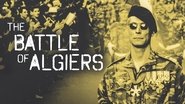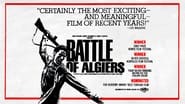Inclubabu
Plot so thin, it passes unnoticed.
2freensel
I saw this movie before reading any reviews, and I thought it was very funny. I was very surprised to see the overwhelmingly negative reviews this film received from critics.
Blake Rivera
If you like to be scared, if you like to laugh, and if you like to learn a thing or two at the movies, this absolutely cannot be missed.
Ortiz
Excellent and certainly provocative... If nothing else, the film is a real conversation starter.
sullivanday
This is great film-making, you truly believe you are watching a documentary. The pacing is just right, the action seems real and the performances are wonderful. It is just fascinating to watch. But in this post-9/11 world, it does put this film in a different light. Are we to admire the characters that shoot people in the back and plant bombs in crowded cafes? Ironically, Algeria struggled for many years with its own internal civil war with terrorist groups.
Sindre Kaspersen
Italian screenwriter and director Gillo Pontecorvo's feature film which he wrote with Italian author and screenwriter Franco Solinas (1927-1982), is inspired by a memory from 1962 which is based on personal experiences. It premiered In competition at the 27th Venice Film Festival in 1966, was shot on locations in Algeria and is an Italy-Algeria co-production which was produced by producer Saadi Yacef. It tells the story about the political and ideologically ingrained liberation front in Algeria, the militaristic and ideologically ingrained French Army and the people of Algeria who had been living under the Regency of Algiers (1525-1830) and under French rule since the annexation of Algiers, Algeria in 1830 by the then Kingdom of France and how they changed the history of Algeria. Distinctly and precisely directed by Italian filmmaker Gillo Pontecorvo (1919-2006), this quietly paced fictional tale which is narrated by a narrator and interchangeably from multiple viewpoints, draws a densely measured and retrospective portrayal of a mid-20th century war regarding colonization and a country's struggle for independence and self-determination whilst living under another country's rule. While notable for its atmospheric milieu depictions and reverent cinematography by Italian cinematographer Marcello Gatti (1924- 2013), this narrative-driven story about paramilitary recruitment, bilateral relations between France and Algeria and the strategic, totalitarian and barbaric methods used by both sides of this massacre of human lives which were as atrocious as those used in the preceding Second World War (1939-1945) where France, amongst many other countries, was annexed by Germany and a precursor of numerous later wars which continued the annihilation of the living, the convenience of impunity which exemplifies inequality for all those human beings on this planet who has and has had the ability to go through this life without killing anyone of their fellow human beings and the should be abolished and spiritless culture and industry of death where saving bullets is prioritized over saving lives, reflects this historic, incoherent, unjustifiable and downright ignorant notion that a five letter word can only be achieved through violation of international law and the sometimes though not always unintentional murder and slaughter of both involved and neutral bystanders which at any given time might be babies or children guilty only of being born, whose deaths are under no circumstances defensible by this la-la land term called collateral damage, and is no eulogy or glorification, reverence or vindication of retaliating militaristic violence concealed by grandiloquent codes of honor, but rather an understated elegy which was initiated by a living insider witness of these historical events and member of the National Liberation Front Algerian and made eighteen years after many Palestinian Arabs were driven of their homes in Israel, escaped and laws were passed by the introductory Israeli government which prevented them from returning to their homes or claiming their property.Released many years after an Egyptian goddess may or may not have existed in ancient Egypt, three years after a French filmmaker made a narrative feature called "Muriel" (1963), two years before a person with the given name Susan wrote: "I'm learning to bring judgment against the world.", six years before an American filmmaker named Dick Richard made a feature film regarding a sixteen-year-old man who dreamed of becoming a cowboy, was recruited by a group of cowboys, got the feeling of belongingness, started believing that his leader was sent to do what he did by … and ended up on the prairie holding his hat on his chest whilst a river was running out from his eyes after having buried all of his friends in the ground whilst a song written by an English poet in the late 1790s called "Amazing Grace" was sung by a female voice, eleven years before the guillotine was abolished in France, twenty-four years before an American group of musicians called Guns N'Roses sang the words: "…and history hides the lies of our civil wars…", twenty-five-years before an American singer and pianist with the middle name Ellen sang the words: "…I've been looking for a savior in these dirty streets…", forty-six years after a twenty-six-year- old Tunisian street hawker ended in self-immolation in Ben Arou, Tunisia after allegedly having been assaulted by a female municipal officer and in doing so initiated a revolution, forty-eight years after a Norwegian singer named Anne Grete Preus sang the words: "… consider carefully what you should mean - - it can become costly to stand alone…" which originated from an ironic poem written in 1963 by a Norwegian 20th century author and eyewitness of this battle named Jens Ingvald Bjørneboe (1920-1976) and forty-nine years after an Iranian-Swedish émigré, refugee and musician sang her own written words: "…Just because its black in the dark - - doesn't mean there's no colors…", depicts some dense studies of character and contains a great and timely score by Italian composers Gillo Pontecorvo and Ennio Morricone. This historic, reflective and humane testimony and reconstruction of real events from the late 1960s which is set in Algeria in the late 1950s and early 1960s when a French-Algerian historian named Danièle Djamila Amrane-Minne collaborated with the persons who were most instrumental in the armed conflict, and where the actions and the views of men from both sides are presented and informatively depicted, is impelled and reinforced by its cogent narrative structure, subtle character development and continuity, the self-explanatory and alluding comment by a member of the French army after dressing an Algerian prisoner in a French uniform: "Now, he is nationalized." and the many good acting performances by French and Algerian citizens, actors and actresses. A cinematographic and silently perspicacious narrative feature.
baluga H
Any ethnic group, natives, or Indigenous peoples should watch this film. It will inspire you why people should fight their freedom. And it also warn people try to see through the governor's trick. The gap between governor and people is real big. Most governor only think how to rule their people. But never in people's view, to think how to service people, especially in the age of globalization. Hence people should to know what is really good for us and what is not. Don't be silence. You should speak louder and louder. You should fight for your belief. Otherwise, people never can get the real freedom. The bad governor, Financial Group, and politician will take everything from you.
Jack Banister
I was scanning channels and happened upon La "Battaglia di Algeri," on TCM. I usually don't watch TCM (I should), but there really wasn't anything else on so I gave it a shot! All I can say is that the acting, plot, and cinematography are among the best I've seen. I never really knew anything about the FLN, Algeria, or the French occupation until I saw this movie. Afterwards I felt much better versed on the subject and even was able to make parallels into modern terrorism and anti-western sentiments felt by Islamic countries. I never realized how far back the roots go. This movie is also fair in portraying brutality on both sides. It definitely appears to be objective in its treatment of the subject matter. The acting is just. Amazing. Whether it be colonel Mathieu or the various Algerian actors, every performance is done to a tee. The score was interesting. It included a lot of percussion and a few strings. When I find out that it was Enrio Morricone, I wasn't surprised. It was awesome! My advice, check this film out. You will not be disappointed.





